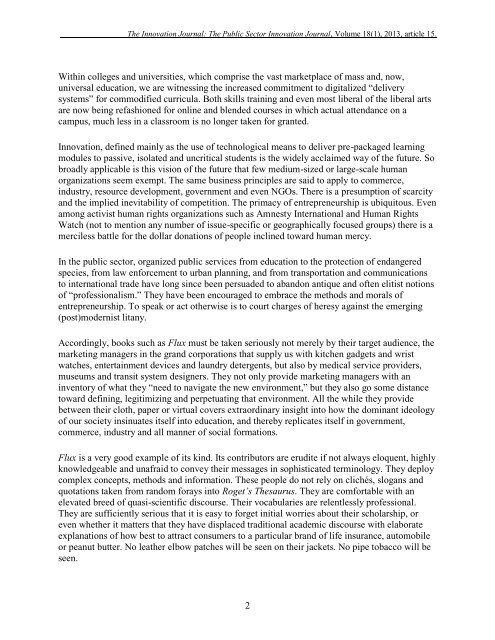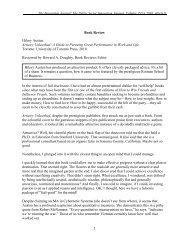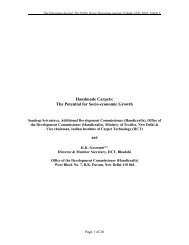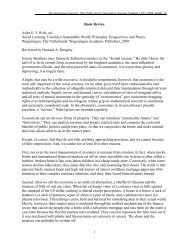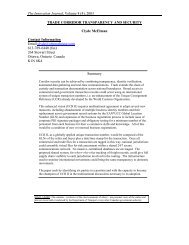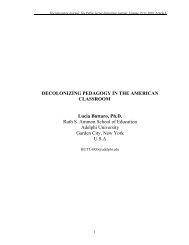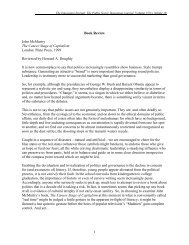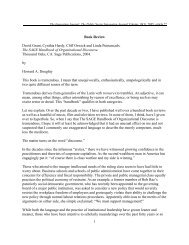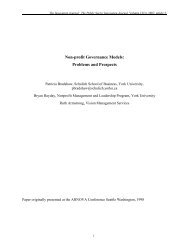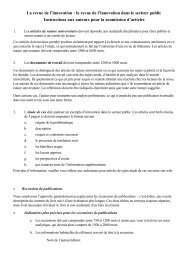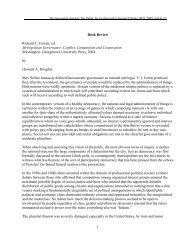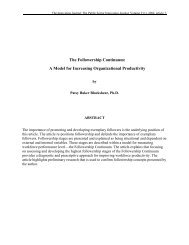What Marketing Managers Need to Navigate the New Environment
What Marketing Managers Need to Navigate the New Environment
What Marketing Managers Need to Navigate the New Environment
Create successful ePaper yourself
Turn your PDF publications into a flip-book with our unique Google optimized e-Paper software.
The Innovation Journal: The Public Sec<strong>to</strong>r Innovation Journal, Volume 18(1), 2013, article 15.<br />
Within colleges and universities, which comprise <strong>the</strong> vast marketplace of mass and, now,<br />
universal education, we are witnessing <strong>the</strong> increased commitment <strong>to</strong> digitalized “delivery<br />
systems” for commodified curricula. Both skills training and even most liberal of <strong>the</strong> liberal arts<br />
are now being refashioned for online and blended courses in which actual attendance on a<br />
campus, much less in a classroom is no longer taken for granted.<br />
Innovation, defined mainly as <strong>the</strong> use of technological means <strong>to</strong> deliver pre-packaged learning<br />
modules <strong>to</strong> passive, isolated and uncritical students is <strong>the</strong> widely acclaimed way of <strong>the</strong> future. So<br />
broadly applicable is this vision of <strong>the</strong> future that few medium-sized or large-scale human<br />
organizations seem exempt. The same business principles are said <strong>to</strong> apply <strong>to</strong> commerce,<br />
industry, resource development, government and even NGOs. There is a presumption of scarcity<br />
and <strong>the</strong> implied inevitability of competition. The primacy of entrepreneurship is ubiqui<strong>to</strong>us. Even<br />
among activist human rights organizations such as Amnesty International and Human Rights<br />
Watch (not <strong>to</strong> mention any number of issue-specific or geographically focused groups) <strong>the</strong>re is a<br />
merciless battle for <strong>the</strong> dollar donations of people inclined <strong>to</strong>ward human mercy.<br />
In <strong>the</strong> public sec<strong>to</strong>r, organized public services from education <strong>to</strong> <strong>the</strong> protection of endangered<br />
species, from law enforcement <strong>to</strong> urban planning, and from transportation and communications<br />
<strong>to</strong> international trade have long since been persuaded <strong>to</strong> abandon antique and often elitist notions<br />
of “professionalism.” They have been encouraged <strong>to</strong> embrace <strong>the</strong> methods and morals of<br />
entrepreneurship. To speak or act o<strong>the</strong>rwise is <strong>to</strong> court charges of heresy against <strong>the</strong> emerging<br />
(post)modernist litany.<br />
Accordingly, books such as Flux must be taken seriously not merely by <strong>the</strong>ir target audience, <strong>the</strong><br />
marketing managers in <strong>the</strong> grand corporations that supply us with kitchen gadgets and wrist<br />
watches, entertainment devices and laundry detergents, but also by medical service providers,<br />
museums and transit system designers. They not only provide marketing managers with an<br />
inven<strong>to</strong>ry of what <strong>the</strong>y “need <strong>to</strong> navigate <strong>the</strong> new environment,” but <strong>the</strong>y also go some distance<br />
<strong>to</strong>ward defining, legitimizing and perpetuating that environment. All <strong>the</strong> while <strong>the</strong>y provide<br />
between <strong>the</strong>ir cloth, paper or virtual covers extraordinary insight in<strong>to</strong> how <strong>the</strong> dominant ideology<br />
of our society insinuates itself in<strong>to</strong> education, and <strong>the</strong>reby replicates itself in government,<br />
commerce, industry and all manner of social formations.<br />
Flux is a very good example of its kind. Its contribu<strong>to</strong>rs are erudite if not always eloquent, highly<br />
knowledgeable and unafraid <strong>to</strong> convey <strong>the</strong>ir messages in sophisticated terminology. They deploy<br />
complex concepts, methods and information. These people do not rely on clichés, slogans and<br />
quotations taken from random forays in<strong>to</strong> Roget’s Thesaurus. They are comfortable with an<br />
elevated breed of quasi-scientific discourse. Their vocabularies are relentlessly professional.<br />
They are sufficiently serious that it is easy <strong>to</strong> forget initial worries about <strong>the</strong>ir scholarship, or<br />
even whe<strong>the</strong>r it matters that <strong>the</strong>y have displaced traditional academic discourse with elaborate<br />
explanations of how best <strong>to</strong> attract consumers <strong>to</strong> a particular brand of life insurance, au<strong>to</strong>mobile<br />
or peanut butter. No lea<strong>the</strong>r elbow patches will be seen on <strong>the</strong>ir jackets. No pipe <strong>to</strong>bacco will be<br />
seen.<br />
2


